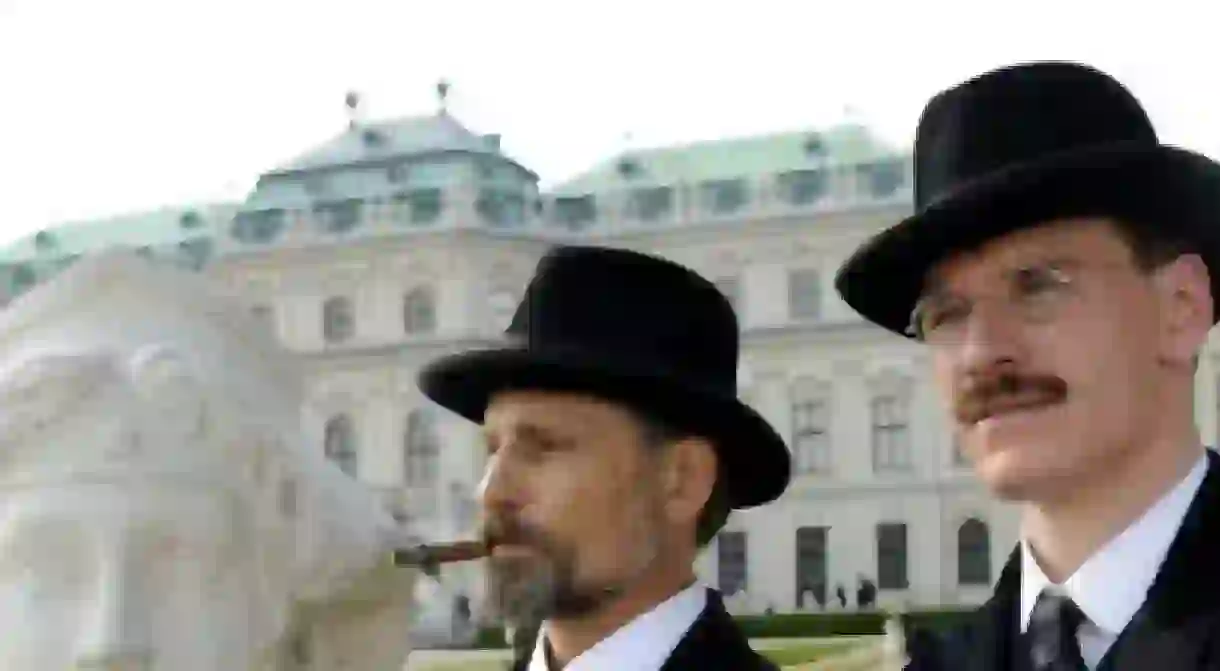10 Great Movie Valentines To Vienna

Once the cutting edge of literary, music and intellectual culture, Vienna has been an inspiration to generations of filmmakers. We present the cream of Viennese classics, which range from depictions of 18th-century court life to modern-day love affairs set against the backdrop of Vienna’s opulent architecture.
The Marriage Circle (1924)
This influential silent film is a comedy about Vienna’s high society directed by Berliner Ernst Lubitsch. The Marriage Circle, inspired by Charlie Chaplin and Vienna’s operetta tradition, is even said to be one of Alfred Hitchcock’s favorite films. Lubitsch demonstrates his ability to create sepia-toned images that evoke a world of sound. There are many twists and turns along the way, pushed along by a talented cast including Monte Blue and Marie Prevost.
Letter From An Unknown Woman (1948)
Austrian author Stefan Zweig has proven to be an influential figure in cinema. His influence is still apparent: director Wes Anderson cited Zweig as a major inspiration for The Grand Budapest Hotel. Max Ophüls’ Letter From An Unknown Woman, based on a novella by Zweig and set in Vienna at the turn of the 20th century, stars Joan Fontaine as woman who becomes obsessed with a new neighbor in her apartment complex. Vienna’s musical legacy is used as a vehicle to heighten the tragedy.
The Third Man (1949)
Orson Welles excels as the charming but morally repugnant racketeer Harry Lime in Carol Reed’s British film noir, which won an Oscar and the Grand Prix at Cannes. The film was greeted with ambivalence in Austria, no doubt because it shatters the romantic image of Vienna by depicting it as a divided city in ruins following World War II. One of the greatest sequences is the chase in the sewage system.
Sissi (1955)
This is the first film in a trilogy about Austria’s Empress Elisabeth. Directed by Ernst Marischka and starring Romy Schneider, it documents the romantic pursuit of Elisabeth – nicknamed Sissi – by Emperor Franz Joseph I. Portraying an engaging vision of Habsburg Vienna, the Sissi trilogy was filmed at the majestic Schönbrunn Palace, still the most popular tourist attraction in the city. It handsomely captures the imperial atmosphere of 18th-century Vienna.
https://www.youtube.com/watch?v=ilx8_Z-Ab2Y
Mayerling (1968)
This lavish production, directed by Terrence Young, is inspired by the rather suspicious circumstances surrounding the death of the Crown Prince Rudolph of Austria and his lover Baroness Mary Vetsera. Omar Sharif and Catherine Deneuve play the doomed lovers in 19th-century Vienna. The prince’s explosive confrontations with his father, Emperor Franz Joseph I, and involvement in a failed Hungarian uprising lead to tragedy. The Mayerling Incident was a momentous moment in Austrian history, and conspiracy concerning the lovers’ deaths still abound.
Amadeus (1984)
Milos Forman’s film of Peter Shaffer’s play won a glut of awards, including eight Oscars. It fictionalizes the extreme rivalry between court composer Antonio Salieri (F. Murray Abraham) and Mozart (Tom Hulce). Salieri is the only person in Vienna who grasps what a genius Mozart is, yet this realization accentuates his frustration, fostering an all-consuming jealousy and bitterness. Thanks to its superb cinematography and costumes, the film is truly evocative of 18th-century Vienna.
Before Sunrise (1995)
Richard Linklater’s wistful film, starring Ethan Hawke as Jesse and Julie Delpy as Céline, takes the viewers on a romantic tour of Vienna. Featured monuments include the Maria Theresien Platz, a picturesque park situated between the Art History Museum and the Natural History Museum. Then there is the Riesenrad, Vienna’s giant ferris wheel, where the pair share their first kiss. They later drink in the enchanting view from the balcony of the Albertina Museum, as Jesse quotes W.H. Auden’s poem “As I Walked Out One Evening.”With many visitors coming over to Vienna to retrace Jesse and Celine’s footsteps, Before Sunrise has made a lasting contribution to the city’s tourism.
The Piano Teacher (2001)
Erika Kohut (Isabelle Huppert), a middle-aged teacher at the Vienna Conservatory, still lives with her possessive mother and is eaten up by a deep sense of dissatisfaction. When a young man begins to pursue her, Erika’s sado-masochistic tendencies manifest themselves in perverse sexual fantasies. Working from a novel by Elfriede Jelinek, visionary Austrian director Michael Haneke orchestrates Erika’s tragic psychodrama with swathes of glorious classical music, plunging the audience into an inspired nightmare.
A Dangerous Method (2011)
Though A Dangerous Method is not David Cronenberg’s best film, it does do an important job of highlighting the 1920s Vienna Circle, the founding members of which sought to advance their thoughts on Logical Positivism. Based on John Kerr’s 1993 book A Most Dangerous Method: The Story of Jung, Freud and Sabina Spielrein, it partially chronicles Jung and Freud’s early relationship in Vienna and features the famous Cafe Sperl near Freud’s home.
Museum Hours (2012)
Director Jem Cohen fell in love with the venerable Kunsthistorisches Art Museum when he was a guest of the Viennale. His charming Museum Hours depicts the relationship between aging museum steward Johann and Canadian visitor Anne. Their platonic friendship evolves as they bond over artworks by Brueghel, Rubens, and Rembrandt. As they meander round Vienna, with Johann acting as an impromptu tour guide, the city is documented like a tapestry created by Brueghel. Ultimately, Museum Hours explores the relationship between art and friendship.













